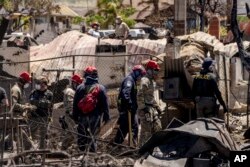Native Hawaiians and others from a Maui community devastated by ferocious fire said Friday they worry Hawaii's governor is moving too quickly to rebuild what was lost while the grief is still raw.
"The fire occurred only 10 days ago, and many people are still in shock and mourning," said Tiare Lawrence, who grew up in Lahaina. She spoke during an emotional news conference organized by community activists who called on Governor Josh Green to give residents time to grieve, provide community leaders with recovery decision-making roles, and comply with open-records laws amid distrust in the government response to the disaster.
The governor and his wife were scheduled to give a livestreamed address from Honolulu on Friday evening with updates on the response to the Maui wildfires that killed at least 111 people. Earlier this week, he said he would announce details of a moratorium on land transactions in Lahaina to prevent people from falling victim to land grabs.
Since the flames consumed much of Lahaina, locals have feared a rebuilt town could become even more oriented toward wealthy visitors.
Green has said Lahaina's future will be determined by its people but didn't immediately respond to a request for comment on the group's concerns.
"The governor should not rush to rebuild the community without first giving people time to heal, especially without including the community itself in the planning," she said. "Fast-track development cannot come at the cost of community control."
More than a dozen of Lawrence's uncles and cousins fled the fast-moving fire last week and went east to her Pukalani home.
The coalition of activists, under the umbrella of a group calling itself "Na Ohana o Lele: Lahaina," were especially concerned about the impact of development to the environment and noted how mismanagement of resources — particularly land and water — contributed to the quick spread of the fire.
Normal life resumes elsewhere
While crews sifted through ashes and rubble in Lahaina, scenes of normalcy continued in other parts of Maui, even if the tragedy hung heavy over the island.
Off the coast of Kihei Friday morning, a holiday marking Hawaii's statehood, paddlers in outrigger canoes glided through Maalaea Bay about 20 miles (32 kilometers) south of Lahaina. Fishermen cast their lines from knee-deep water. And beachgoers strolled along the sand.
The search for the missing moved beyond Lahaina to other communities that were destroyed. Teams had covered about 58% of the Lahaina area and the fire was 90% contained as of Thursday night, Maui County officials said.
Six forensic anthropologists with the Department of Defense POW/MIA Accounting Agency are assisting in gathering and identifying human remains, the Pentagon said in a statement Friday. The group is experienced in verifying DNA from long-lost service members, many of whom died as long ago as World War II.
There was no word Friday on who would replace the Maui Emergency Management Agency administrator who abruptly resigned Thursday after defending a decision not to sound outdoor sirens during the fire.
Herman Andaya had said this week that he had no regrets about not deploying the system because he feared it could have caused people to go toward the mountains or inland.
"If that was the case, then they would have gone into the fire," Andaya explained. He stepped down a day later.
The decision to not use the sirens, coupled with water shortages that hampered firefighters and an escape route clogged with vehicles overrun by flames, has brought intense criticism from many residents following the deadliest wildfire in the United States in more than a century.
The lack of sirens has emerged as a potential misstep, part of a series of communication issues that added to the chaos, according to reporting by The Associated Press.
Hawaii Attorney General Anne Lopez said Thursday that an outside organization will conduct "an impartial, independent" review of the government's response.
Hotels will house evacuees
Corrine Hussey Nobriga said it was hard to lay blame for a tragedy that took everyone by surprise, even if some of her neighbors raised questions about the absence of sirens and inadequate evacuation routes.
The fire moved quickly through her neighborhood, though her home was spared.
"One minute we saw the fire over there," she said, pointing toward faraway hills, "and the next minute it's consuming all these houses."
Authorities hope to empty crowded, uncomfortable group shelters by early next week, said Brad Kieserman, vice president for disaster operations with the American Red Cross. Hotels also are available for eligible evacuees who have spent the last eight days sleeping in cars or camping in parking lots, he said.
Contracts with the hotels will last for at least seven months but could easily be extended, he said. Service providers at the properties will offer meals, counseling, financial assistance and other disaster aid.
The governor has said at least 1,000 hotel rooms will be set aside. In addition, Airbnb said its nonprofit wing will provide properties for 1,000 people.







